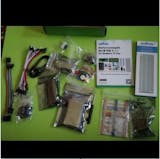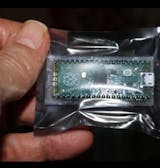Kit d'apprentissage de programmation matérielle OSOYOO Python avec carte Raspberry Pi Pico

Kit d'apprentissage de programmation matérielle OSOYOO Python avec carte Raspberry Pi Pico
- Raspberry Pi Pico est une carte microcontrôleur haute performance et peu coûteuse dotée d'interfaces numériques flexibles.
-
Il est construit sur RP2040, une toute nouvelle puce développée ici même chez Raspberry Pi. Que vous recherchiez une carte autonome pour un développement profondément intégré ou un compagnon pour votre ordinateur Raspberry Pi, ou que vous fassiez vos premiers pas avec un microcontrôleur, cette carte est faite pour vous.
Pour le Pico, nous avons créé le kit d'apprentissage de base. Nous avons préparé de nombreux projets intéressants et pratiques pour vous et collecté de nombreuses informations faisant autorité. Allumez simplement votre ordinateur et vous pourrez compléter votre apprentissage de la programmation.
-
Caractéristiques du Raspberry Pi Pico :
Puce de microcontrôleur RP2040 conçue par Raspberry Pi au Royaume-Uni
• Processeur Arm Cortex M0+ double cœur, horloge flexible fonctionnant jusqu'à 133 MHz
• 264 Ko de SRAM et 2 Mo de mémoire Flash intégrée
• Le module crénelé permet de souder directement sur les cartes porteuses
• USB 1.1 avec prise en charge des appareils et des hôtes, modes veille et veille à faible consommation
• Programmation par glisser-déposer à l'aide du stockage de masse via USB
• 26 × broches GPIO multifonctions, horloge et minuterie précises sur puce
• 2 × SPI, 2 × I2C, 2 × UART, 3 × ADC 12 bits, 16 × canaux PWM contrôlables
• Capteur de température, bibliothèques à virgule flottante accélérées sur puce
Langages de programmation et tutoriels
- Nous avons des vidéos d'utilisation, des PDF et des didacticiels en ligne, tout le monde peut facilement apprendre à utiliser le Pico.
- Nous proposons 3 langages de programmation : MicroPython、IDE(C/C++) et Piper (programmation graphique). Vous pouvez visualiser différents tutoriels selon vos besoins
Pour plus d'informations, voir : https://osoyoo.com/2021/07/28/raspberry-pi-pico-learning-kit/
Shipping cost is based on weight. Just add products to your cart and use the Shipping Calculator to see the shipping price.
We want you to be 100% satisfied with your purchase. Items can be returned or exchanged within 30 days of delivery.






















